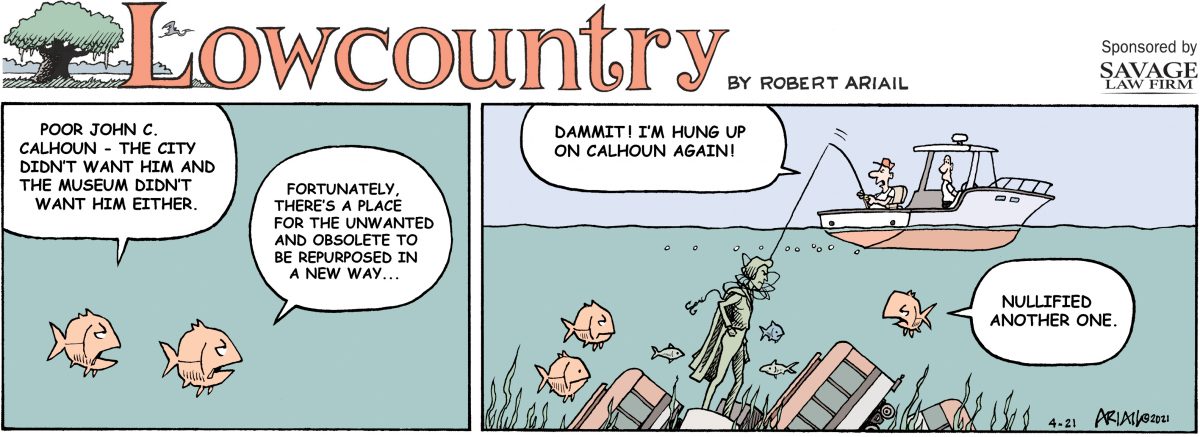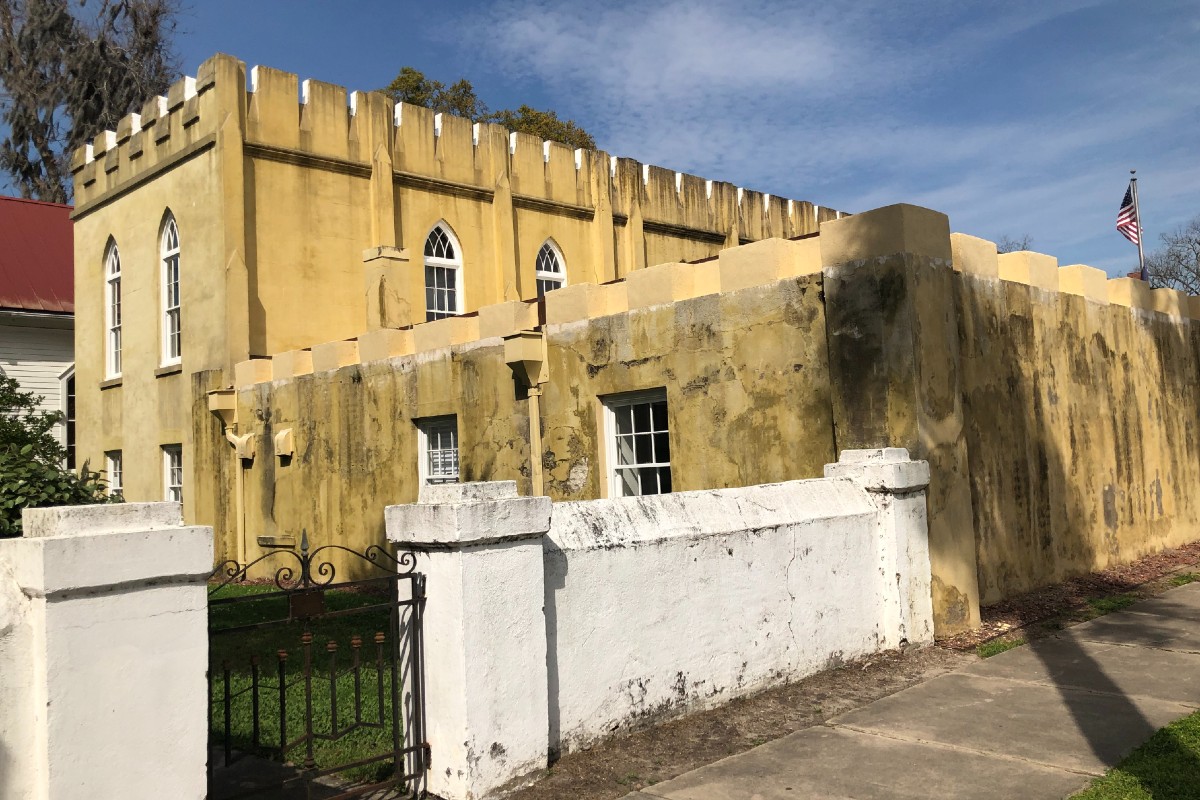STATEHOUSE REPORT | ISSUE 20.17 | APRIL 23, 2021
BIG STORY: Clock winds down on legislature as budget debate to start
NEWS BRIEFS: Senate vote gives Santee Cooper room to breathe
LOWCOUNTRY, Ariail: Hung up on Calhoun
COMMENTARY, Brack: On the dumbing down of American political discourse
SPOTLIGHT: S.C. Education Association
MY TURN, Leventis: Open carry of guns isn’t in S.C.’s best interest
FEEDBACK: Send us your thoughts
MYSTERY PHOTO: Not the Citadel
Clock winds down on legislature as budget debate to start

By Andy Brack, editor and publisher | Time is running out for lawmakers who are trying to get pet issues finished before the regular legislative session ends in three weeks.
And with the state Senate next week debating its plan to spend $11.4 billion in state revenues — an all-time high — time will be more precious for those pushing legalization of medical marijuana, an open carry gun law and punishment for hate crimes.
Much of the focus will be in the state Senate, where debates are often longer and more drawn out in the House. It continues to work on election reform and other issues, but those aren’t expected to come up until next year due to procedural rules.
“The House, under Speaker Jay Lucas, has managed its calendar exceptionally well and has set a high standard for others to attempt to emulate,” observed Rep. Kirkman Finlay, R-Columbia.
Rep. Bill Herbkersman, R-Bluffton, added, “We’re about done with the major legislation and just (need to) clean up bills and Senate bills that made the crossover deadline.”
A look at the legislative schedule
Senators will begin debate on the state’s 2021-22 budget on Tuesday. Expectations are for discussions to take a week. If they take longer, there will be less time on the floor for other issues.
The regular legislative session is expected to end May 13, but lawmakers will likely return to Columbia for two special sessions:
In June, they’ll likely make a final vote on the budget in mid-June to finish compromises hammered out by a conference committee that will be appointed before May 13. While the “sine die” session will be limited in scope and usually lasts only a couple of days, they’ll have until June 30 to finish to ensure the state has a budget by July 1, the first day of its new fiscal year.
Then in the fall, legislators will come back to deal with at least three big ticket items:
- How to spend more than $500 million in settlement funds received from the federal government for the Savannah River Site;
- What to do with about $2 billion in South Carolina’s share of recovery funds from a recent federal stimulus package; and
- Legislative reapportionment. Generally every 10 years, lawmakers receive new census figures in the spring of years ending in 1, but this year due to delays, new numbers aren’t expected to be available until the end of September, delaying redistricting.
Millions more available to the Senate
The House budget plan passed in March included $9.6 billion in revenue from state taxes as well as $897 million in non-recurring revenues left over from past surpluses and unspent reserves not used last year because of the pandemic. New recurring revenues were projected to be about $189 million, based on February estimates from the state Board of Economic Advisors (BEA).
But earlier this month, the BEA modified its revenue forecast to add about $300 million to its revenue forecast, plus another $500+ million to what’s socked away in non-recurring revenues. The result: A 2021-22 spending plan worth $11.4 billion of state funds. Combined with projected federal spending in the state of $9.5 billion and $11.6 billion from “other funds,” which includes money for roads and college tuition, an estimated $31.8 billion in government funding is expected to flow through the Palmetto State in the coming fiscal year.
Other bills in the hopper

Here is a look at some major bills still in limbo as lawmakers race to the session’s regular finish line:
Medical marijuana. State Sen. Tom Davis, R-Beaufort, says a conservative bill to allow medical use of marijuana to relieve pain and suffering is mired in an objection filed by Sen. Greg Hembree, R-Myrtle Beach. If the objection isn’t withdrawn, the measure may be forced into the next session.
Hate crimes. A bill to add prison time and fines for people who commit hate crimes was approved this week by a Senate Judiciary subcommittee, but some think the measure may not have enough time to get through the full committee and full Senate. “Members are disputing the protected classes and are looking for reasons to object to the bill,” said state Rep. Beth Bernstein, D-Columbia. South Carolina is one of just three states without hate crimes protections.

Open carry. While the House passed two bills to allow handgun owners to openly display pistols, the measures are caught in the Senate. It’s unclear whether senators will address the contentious issue this year.
Santee Cooper. The Senate this week approved a much different plan from the House on the future of Santee Cooper, a state utility. Senators voted 44-1 to reform, not sell, the state utility. Not in the Senate bill was a House proposal to create a panel to consider offers to sell all or part of Santee Cooper.
Family leave. A House version providing 12 weeks of paid leave for state employees on the birth or adoption of a child went to the Senate before the crossover deadline and may have enough support to get through the upper chamber before May 13, Bernstein said.
- Have a comment? Send to: feedback@statehousereport.com.
Senate vote gives Santee Cooper room to breathe

By Andy Brack, editor and publisher | South Carolina senators voted 44-1 Thursday to reform, not sell, Santee Cooper, the state’s utility. Its plan contrasts with a House proposal to set up a panel to consider selling all or part of the generator, which has been mired in controversy since the $9 billion debacle in 2017 of a project to build nuclear reactors in Fairfield County.
“We recognize and appreciate the considerable time and effort that legislators have spent getting to this point, and we are hopeful this will lead to a resolution that brings the most benefit to our customers and the state,” said Santee Cooper spokeswoman Mollie Gore today.
The House, which now will get the Senate’s revision of a House bill, is expected to disagree, which will force the issue into a conference committee for lawmakers to develop a compromise. It’s unclear whether there’s enough time in the session to hammer out a House-Senate deal on the issue that’s been contentious for years and led Santee Cooper’s private partner in the nuclear deal, SCE&G, to be sold to Dominion Energy.
In recent months, NextEra Energy has been spending big on television ads to showcase its offerings even though it currently doesn’t operate in the state. The Florida-based utility has been clear it wants to purchase Santee Cooper, which was reiterated in a letter last week in which it essentially sought to meet privately with lawmakers to work out a deal. The push may have backfired this week as senators voted 38-6 during the Santee Cooper debate to reject addition of a provision for a legislative committee to take offers on the state utility.
In related news, Gov. Henry McMaster has nominated former state House representative and former U.S. attorney Peter McCoy of Charleston for a seven-year post as board chair of Santee Cooper.
In other recent news:
![]() Senators ask S.C. prosecutor to probe DJJ audit. A South Carolina Senate panel looking into an audit of the state agency that houses and educates juvenile offenders has now asked S.C. Attorney General Alan Wilson to probe the same report to decide whether anyone may have acted “improperly or criminally.” More: The State
Senators ask S.C. prosecutor to probe DJJ audit. A South Carolina Senate panel looking into an audit of the state agency that houses and educates juvenile offenders has now asked S.C. Attorney General Alan Wilson to probe the same report to decide whether anyone may have acted “improperly or criminally.” More: The State
McMaster sets aside $12.5M for expanding juvenile programs. McMaster announced Wednesday that he is investing $12.05 million to expand juvenile delinquency prevention programs. The money comes from his discretionary use of federal coronavirus relief funds. More: Florence Morning News
Hate crime bill backers rush against session end in S.C. Supporters of making South Carolina the next-to-last state in the U.S. to pass a hate crime law acknowledged Wednesday they are running out of time in this year’s legislative session. The bill passed the House and is now in the full Senate Judiciary Committee. Senators are already saying it will be hard to get it to the floor before the session ends May 13. More: AP/South Carolina Public Radio
Moore introduces 911-abuse bill. Hanahan Democratic Rep. J.A. Moore has introduced a bill named the “Caution Against Racially Exploitative Non-Emergencies” act — or the CAREN Act. It seeks to curb racially motivated calls to 911. The bill seems to be a reference to the internet meme of being a “Karen,” a fictional woman who, among other things, calls the police on Black people who are simply doing human things. More: Charleston City Paper
S.C. Senate OKs raises for teachers, state workers. The Senate Finance Committee set aside money for a 2 percent raise for state employees and a $1,000 raise for all teachers after a budget draft found the economic downturn in the wake of the pandemic was not as bad as feared. More: AP News
McMaster signs five-day learning bill into law. The governor has signed a bill into law that requires all school districts in the state to offer five days of in-person learning every week starting April 26. More: WIS TV
Scott to deliver GOP rebuttal to Biden address. U.S. Sen. Tim Scott, R-South Carolina, will deliver Republicans’ rebuttal to President Joe Biden’s joint address to Congress next week. More: AP News
Chauvin verdict renews Scott’s fight for police reform. U.S. Sen. Tim Scott, R-South Carolina, has led Republicans in crafting a police reform bill in the wake of the George Floyd killing by police in Minneapolis. Now that one of those officers has been convicted of murder — Derek Chauvin — Scott is among those in Washington looking to tweak police policies on the federal level. More: The Washington Post
Cunningham eyes governor’s seat. Former Democratic Congressman Joe Cunningham of Charleston upset the Republican grip on a congressional seat for only one term. Now, he’s looking at another Republican stronghold in the state: governor. He filed preliminary paperwork for a run recently. More: The Charlotte Observer
Hung up on Calhoun

Here’s a new cartoon by Robert Ariail that first was published in our sister newspaper, the Charleston City Paper. Love it? Hate it? What do you think: feedback@statehousereport.com.
On the dumbing down of American political discourse

By Andy Brack, editor and publisher | Maybe it’s smartphones. Or television and the 10-second soundbite. Maybe it’s all of that instant access to information.
But any way you look at it, the people who get microphones stuck in front of their faces these days just don’t seem as smart or pithy as they did a few decades — or centuries — ago.
 This conclusion grew after I read something current British Prime Minister Boris Johnson said in 2004: “My chances of being PM are about as good as the chances of finding Elvis on Mars, or my being reincarnated as an olive.”
This conclusion grew after I read something current British Prime Minister Boris Johnson said in 2004: “My chances of being PM are about as good as the chances of finding Elvis on Mars, or my being reincarnated as an olive.”
Why don’t our leaders talk like that — or talk in ways that truly inspire? American political speak has become mostly boring, often being little more than a race to nastiness. It’s less inspirational than pure vanilla, fraught with buzzwords, poll-tested stock phrases and blather.
These days, when are you really knocked out of your socks with words like Franklin Roosevelt’s “The only thing to fear is fear itself,” or Ronald Reagan’s “Mr. Gorbachev, tear down this wall,” or John F. Kennedy’s “Ask not what your country can do for you,” or Dr. Martin Luther King Jr.’s dream?
Instead we get (or, at least, used to get) nasty tweets or insults or dull sobriquets that dumbed down America. Where are the modern Mark Twains, Winston Churchills or Oscar Wildes? What about the Eleanor Roosevelts or Vince Lombardis or, even, Yogi Berras?
None of this is to suggest there aren’t a few inspirational leaders and speakers these days. Think of former President Barack Obama or prison reformer Bryan Stevenson. But on balance, they’re the exception in these days of instant information and reaction, not the rule.
“Two of our last three president cared nothing about the English language,” said Indiana University journalism professor Chris Lamb, author of The Art of the Political Putdown: The Greatest Comebacks, Riposts, and Retorts in History.
“The exception was, of course, Obama, who used the English language like a Wynton Marsalis plays the trumpet, which is ironic, if you believe the right wing, because Obama was of course born in Kenya. Obama really understands words. Bush and Trump treated words like they were unwanted bugs.”
Politicians, in particular, may not be less smart than they were a generation or five ago, but there is something weird going on in the verbal ether.
“I think they’re lazier and too many of them don’t give a damn about words,” said Lamb, who once taught at the College of Charleston. “When you listen to NPR or PBS, everyone being interviewed sounds really smart, except (Ohio Congressman) Jim Jordan, but he’s not interviewed very much. When you watch Fox News, so many people being interviewed – and everyone doing the interviews – sound like morons. See Jim Jordan.”
In his 2020 collection of putdowns, Lamb pointed to how former President Donald Trump used words by responding “with the finesse of a knee to the groin. His comebacks are more like something you would hear on an elementary school playground.”
Cases in point — the demeaning nicknames he gave GOP and Democratic opponents, from “Lyin’ Ted” Cruz and “Little Marco” Rubio to “Crooked Hillary” Clinton and “Sleepy Joe” Biden.
In 2018, for example, Trump blasted French President Emmanuel Macron in a series of tweets about NATO and how European armies shouldn’t rely so much on U.S. support.
But Macron may have gotten the better of him when he told a French journalist, “I do not do policy or diplomacy by tweets.”
Smart political talk is the exception, not the rule. But since Trump left office, the level of debate seems to have improved, albeit slightly. Let’s hope our leaders can have more civilized discussions and fewer putdowns, although we don’t want to put Chris Lamb out of a job!
Andy Brack is editor and publisher of Statehouse Report and publisher of the Charleston City Paper. Have a comment? Send to: feedback@statehousereport.com.
The S.C. Education Association
 The public spiritedness of our underwriters allows us to bring Statehouse Report to you at no cost. This week’s spotlighted underwriter is The South Carolina Education Association(The SCEA), the professional association for educators in South Carolina. Educators from pre-K to 12th grade comprise The SCEA. The SCEA is the leading advocate for educational change in South Carolina. Educators in South Carolina look to The SCEA for assistance in every aspect of their professional life. From career planning as a student to retirement assessment as a career teacher, The SCEA offers assistance, guidance, and inspiration for educators.
The public spiritedness of our underwriters allows us to bring Statehouse Report to you at no cost. This week’s spotlighted underwriter is The South Carolina Education Association(The SCEA), the professional association for educators in South Carolina. Educators from pre-K to 12th grade comprise The SCEA. The SCEA is the leading advocate for educational change in South Carolina. Educators in South Carolina look to The SCEA for assistance in every aspect of their professional life. From career planning as a student to retirement assessment as a career teacher, The SCEA offers assistance, guidance, and inspiration for educators.
- Learn more: TheSCEA.org
Open carry of guns isn’t in S.C.’s best interest

By Phil Leventis, special to Statehouse Report | If the bill on open carry of guns with restrictions is so very good, why not let people carry guns in the Statehouse and legislators’ home offices?
I was a senator for three decades and never felt so special that I couldn’t live with the laws everyone had to.

One Representative said “a concealed weapon doesn’t comfortably work with certain outfits.” It’s just silly pandering to a very small group.
If this idea is so popular, put it on a referendum in 2022 and identify the sponsors running for re-election.
Will our Supreme Court have to determine the difference between brandishing a gun versus simply making a fashion statement? Is wielding OK if brandishing isn’t?
California previously allowed open carry. In 1968, the Black Panthers, armed to the teeth, “stormed” the California statehouse demanding respect.
What they got was a Republican bill banning open carry which was signed by then-Gov. Ronald Reagan in less than a week!
Michigan uncovered a plot to kidnap and kill the governor which was preceded by a heavily armed band entering their statehouse demanding changes in the law. Then President Trump suggested the governor negotiate with the armed protestors! Republicans took no action.
Law enforcement is opposed to open carry. Governor Henry McMaster was the chief prosecutor for federal and state governments here.
Governor, stand up. Show leadership. Simply say open carry of guns is not in the interest of the common good of South Carolinians. Say you are opposed to open carry.
Phil Leventis is a former Democratic state senator from Sumter. Have a comment? Send to: feedback@statehousereport.com.
Send us your thoughts
We love hearing from our readers and encourage you to share your opinions. But to be published, you’ve got to provide us with contact information so we can verify your letters. Letters to the editor are published weekly. We reserve the right to edit for length and clarity. Comments are limited to 250 words or less. Please include your name and contact information.
-
- Send your letters or comments to: feedback@statehousereport.com
Not the Citadel

This building isn’t at the Citadel. It’s not even in Charleston County, but it is in South Carolina. Send your guess to feedback@statehousereport.com — and remember to include your name, home city and contact information.
 We got lots of different guesses for last week’s mystery, “Fenced-off ruins.” Hats off to those who correctly identified the photo, sent in by Clemson resident Wayne Beam, as the ruins of Tanglewood Mansion near Pendleton. Kudos to Jacie Godfrey of Florence; Frank Bouknight of Summerville; Jay Altman of Columbia; Bill Segars and Don Clark, both of Hartsville; Allan Peel of San Antonio, Texas; Dave Comen and Faith Line, both of Anderson; George Graf of Palmyra, Va.; Henry Eldridge of Tega Cay; and Kevin Mertens of Greenville.
We got lots of different guesses for last week’s mystery, “Fenced-off ruins.” Hats off to those who correctly identified the photo, sent in by Clemson resident Wayne Beam, as the ruins of Tanglewood Mansion near Pendleton. Kudos to Jacie Godfrey of Florence; Frank Bouknight of Summerville; Jay Altman of Columbia; Bill Segars and Don Clark, both of Hartsville; Allan Peel of San Antonio, Texas; Dave Comen and Faith Line, both of Anderson; George Graf of Palmyra, Va.; Henry Eldridge of Tega Cay; and Kevin Mertens of Greenville.
Bouknight gave some additional information: “This property was the site of a private residence as early as 1830’s. In 1860, John Baylis Earle Sloan and his wife, Mollie Seaborne Sloan, established a home that became known as Tanglewood. The columns and the ruins seen today are all that remain of the site, which was first destroyed by fire in 1908. It was a piedmont plantation-style house, resting on tall piers and having large rooms.
“The family rebuilt the home as a classical colonial mansion in 1910, reusing the columns in the portico. Tanglewood stayed in the Sloan family for many years, until it was sold in 1950’s. The building again burned to the ground in 1970. In 2004, funds were allocated by the Anderson County Council for the construction of a new Pendleton branch library of the Anderson County Library System. The Tanglewood property was purchased after negotiations with owners John and Suzanne Morse. Groundbreaking for the library took place on Dec. 17, 2004.”
- Send us a mystery. If you have a photo that you believe will stump readers, send it along (but make sure to tell us what it is because it may stump us too!) Send to: feedback@statehousereport.com and mark it as a photo submission. Thanks.
ORDER NOW: Copies are in Lowcountry-area bookstores now, but if you can’t swing by, you can  order a copy online today.
order a copy online today.
ABOUT STATEHOUSE REPORT
Statehouse Report, founded in 2001 as a weekly legislative forecast that informs readers about what is going to happen in South Carolina politics and policy, is provided to you at no charge every Friday.
Meet our team
- Editor and publisher: Andy Brack, 843.670.3996
- Special correspondent: Lindsay Street
Donate today
We’re proud to offer Statehouse Report for free. For more than a dozen years, we’ve been the go-to place for insightful independent policy and political news and views in the Palmetto State. And we love it as much as you do.
But now, we can use your help. If you’ve been thinking of contributing to Statehouse Report over the years, now would be a great time to contribute as we deal with the crisis. In advance, thank you.
Buy the book
Now you can get a copy of editor and publisher Andy Brack’s We Can Do Better, South Carolina! ($14.99) as a paperback or as a Kindle book ($7.99). . The book of essays offers incisive commentaries by editor and publisher Andy Brack on the American South, the common good, vexing problems for the Palmetto State and interesting South Carolina leaders.
More
- Mailing address: Send inquiries by mail to: P.O. Box 21942, Charleston, SC 29413
- Subscriptions are free: Click to subscribe.
- We hope you’ll keep receiving the great news and information from Statehouse Report, but if you need to unsubscribe, go to the bottom of the weekly email issue and follow the instructions.
- Read our sister publications: Charleston City Paper (every Wednesday) | Charleston Currents (every Monday).
- © 2021, Statehouse Report, a publication of City Paper Publishing, LLC. All rights reserved.


